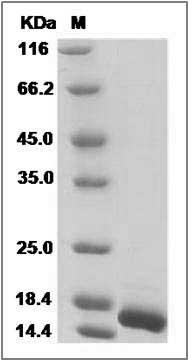-
Product Name
Canine aFGF / FGF1 recombinant protein
- Documents
-
Description
aFGF, also known as FGF1 and HBGF-1, is a member of the fibroblast growth factor family. The biological activity of aFGF protein is exerted through binding to four high affinity cell surface receptors (FGFR1-4), which results in receptor dimerization and transphosphorylation in the tyrosine kinase domain. aFGF protein shows a wide range of endocrine-like activities. As a multiple function growth factor, this protein is involved in embryo development and tissue repair. Additionally, this protein is considered to function in several important physiological and pathological processes, such as embryonic development, morphogenesis, angiogenesis, wound healing and atheromatosis, carcinogenesis, development, and invasion of cancer.
-
Protein name
Fibroblast growth factor
-
Protein short names
FGF
-
Uniprot ID
J9NTP4
-
Gene Name
FGF1
-
Source/Expression Host
E. coli
-
Expression Plasmid/cDNA
A DNA sequence encoding the canine FGF1 (XP_849274.1) (Phe16-Asp155) was expressed with a N-terminal Met.
-
Protein Species
Canine
-
Molecular weight
The recombinant canine FGF1 comprises 141 amino acids and has a predicted molecular mass of 16 kDa. The apparent molecular mass of the protein is approximately 16 kDa in SDS-PAGE under reducing conditions.
-
Purity
> 90 % as determined by SDS-PAGE
-
Activity
Measured in a cell proliferation assay using Balb/c 3T3 mouse embryonic fibroblasts.
The ED50 for this effect is typically 0.05-0.3 ng/ml. -
Validations

Canine aFGF / FGF1 Protein SDS-PAGE
Related Products / Services
Please note: All products are "FOR RESEARCH USE ONLY AND ARE NOT INTENDED FOR DIAGNOSTIC OR THERAPEUTIC USE"
